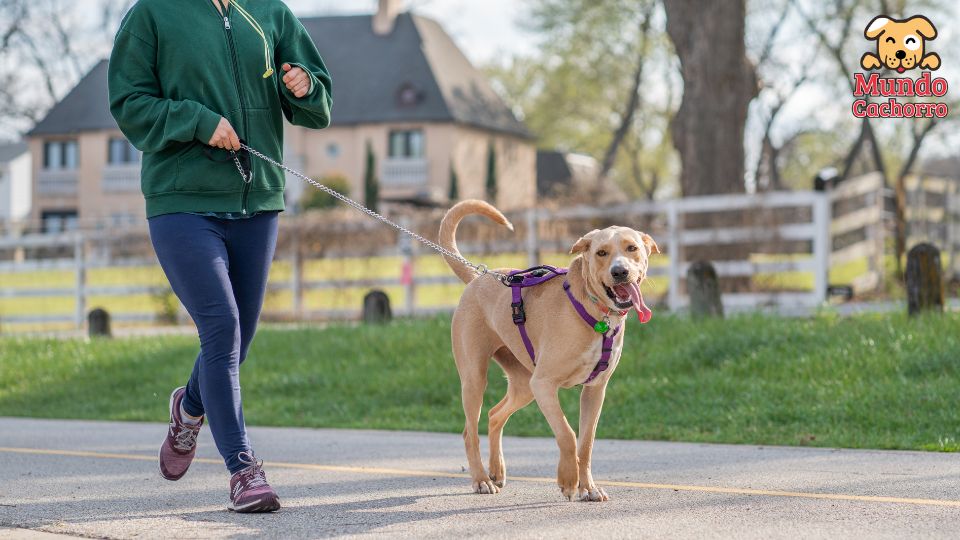Walking your dog is one of the most important activities for its physical and mental well-being.
However, what seems to be a simple task can become complicated if you don’t have the right strategies in place.
Walking a dog is not only about taking him for a walk, but also about providing him with an enriching and safe experience.
Here are three essential tips to enhance walks with your dog, ensuring that they are enjoyable for both you and your faithful friend.
Indice
1. Proper use of the belt and the equipment
Choosing the right belt
The choice of leash is essential for a safe and comfortable walk. Standard leashes between 1.5 and 2 meters are ideal for keeping your dog close and under control, without restricting his movement too much. Although retractable leashes may seem convenient, they can be difficult to manage in crowded areas or if the dog is very energetic.
Leash training your puppy in 12 steps
Harness versus collar
To avoid neck injuries, especially in dogs that tend to pull on the leash, it is recommended to use a harness instead of a collar. A harness distributes pressure more evenly over the dog’s body, which helps prevent damage to the trachea and neck. In addition, the harness provides more control, which is particularly useful for large or strong dogs.
Additional equipment
Consider using accessories such as an LED light or reflective strips if you walk your dog in low light hours. This not only increases visibility, but also improves safety during night walks. In addition, a waste bag dispenser attached to the leash can be very handy for keeping walks clean and environmentally friendly.
Tips for traveling with your dog
2. Establish a routine and appropriate behavior
Establish regular schedules
Dogs thrive on routine, and walks are no exception. Maintaining regular times for walks helps establish a routine that the dog will learn to anticipate and enjoy. In addition, walks at set times can help regulate the dog’s physiological needs, facilitating training and reducing anxiety.
Teaching basic commands
Before leaving the house, it is essential to ensure that the dog responds to basic commands such as “sit”, “stay” and “come”. These commands are essential to maintain control during the walk and ensure the dog’s safety in unforeseen situations. In addition, rewarding the dog with treats or praise when it obeys commands will reinforce good behavior.
Controlling belt pulls
Leash pulling can turn a walk into a frustrating experience.
To avoid this, stop the walk every time the dog pulls and wait for the dog to calm down before continuing. This technique teaches the dog that pulling will not get him where he wants to go, encouraging a calmer, more controlled walk. With patience and consistency, most dogs will learn to walk at an appropriate pace without pulling on the leash.
3. Provide mental stimulation during the walk
Allow time for sniffing
The walk is not only an opportunity for the dog to exercise, but also to explore its environment. Allowing the dog to sniff its environment is crucial to its mental stimulation, as dogs obtain much of their information through smell. While maintaining the pace of the walk is important, taking time for the dog to explore and sniff improves his overall well-being.
Change the route from time to time
Although routine is important, varying walking routes offers new stimuli and prevents the dog from getting bored. New smells, sounds and sights keep the dog mentally active and curious. In addition, exploring different routes can also help socialize the dog, exposing it to new environments, people and other animals.
Games during the ride
Incorporating games during the walk, such as fetching a toy or following a lead, can make the experience even more fun and challenging for the dog. These games not only strengthen the bond between dog and owner, but also provide additional physical and mental exercise.
Final considerations
Walking your dog is an essential activity that goes beyond a simple walk. Using the right equipment, implementing a consistent routine and providing mental stimulation makes walks safer, more enjoyable and beneficial for the dog. By following these three tips, you will not only enhance the walking experience, but also contribute to your pet’s overall well-being.
In addition, remembering that each dog is unique and may require specific adjustments to their walking routine is key to maximizing the benefits. With patience, consistency and attention to the dog’s individual needs, walks can become a highlight of the day for both dog and owner.








